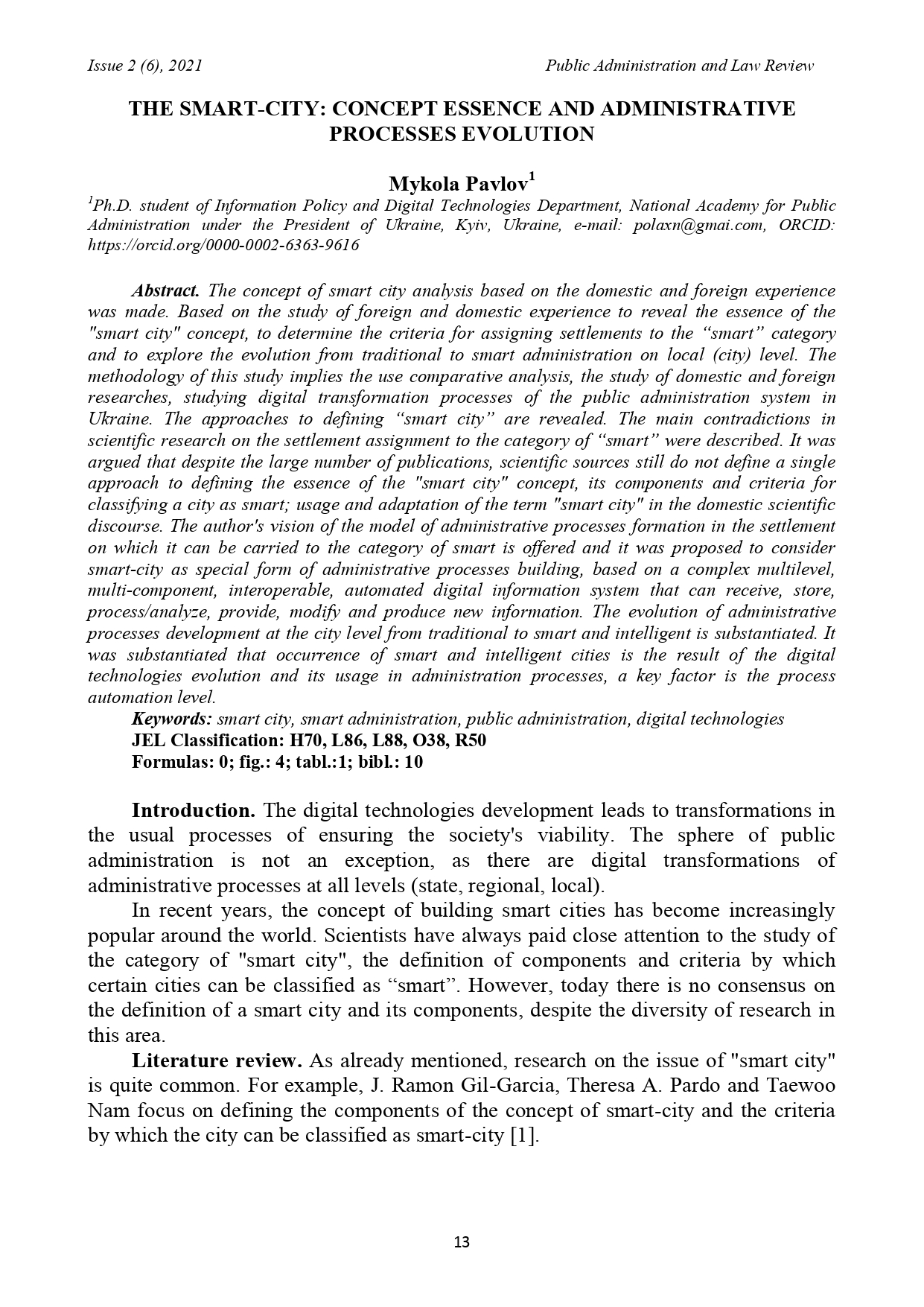THE SMART-CITY: CONCEPT ESSENCE AND ADMINISTRATIVE PROCESSES EVOLUTION
DOI:
https://doi.org/10.36690/2674-5216-2021-2-13Keywords:
smart city, smart administration, public administration, digital technologiesAbstract
The concept of smart city analysis based on the domestic and foreign experience was made. Based on the study of foreign and domestic experience to reveal the essence of the "smart city" concept, to determine the criteria for assigning settlements to the “smart” category and to explore the evolution from traditional to smart administration on local (city) level. The methodology of this study implies the use comparative analysis, the study of domestic and foreign researches, studying digital transformation processes of the public administration system in Ukraine. The approaches to defining “smart city” are revealed. The main contradictions in scientific research on the settlement assignment to the category of “smart” were described. It was argued that despite the large number of publications, scientific sources still do not define a single approach to defining the essence of the "smart city" concept, its components and criteria for classifying a city as smart; usage and adaptation of the term "smart city" in the domestic scientific discourse. The author's vision of the model of administrative processes formation in the settlement on which it can be carried to the category of smart is offered and it was proposed to consider smart-city as special form of administrative processes building, based on a complex multilevel, multi-component, interoperable, automated digital information system that can receive, store, process/analyze, provide, modify and produce new information. The evolution of administrative processes development at the city level from traditional to smart and intelligent is substantiated. It was substantiated that occurrence of smart and intelligent cities is the result of the digital technologies evolution and its usage in administration processes, a key factor is the process automation level.
Downloads
References
Gil-Garcia, J. Ramon & Pardo, Theresa & Nam, Taewoo. (2015). What makes a city smart? Identifying core components and proposing an integrative and comprehensive conceptualization. Information Polity. 20. 61-87. 10.3233/IP-150354.
Smart City Index 2020. URL: https://www.imd.org/smart-city-observatory/smart-city-index/
Jiang, Dingfu. (2019). The construction of smart city information system based on the Internet of Things and cloud computing. Computer Communications. 150. 10.1016/j.comcom.2019.10.035.
Sánchez, Luis & Muñoz, Luis & Galache, Jose & Sotres, Pablo & Santana, Juan & Gutierrez, Veronica & Ramdhany, Rajiv & Gluhak, Alex & Krco, Srdjan & Theodoridis, Evangelos & Pfisterer, Dennis. (2013). SmartSantander: IoT Experimentation over a Smart City Testbed. Computer Networks. 10.1016/j.bjp.2013.12.020.
Silva, Andrea Oliveira & Fernandes, Ricardo. (2020). Smart governance based on multipurpose territorial cadastre and geographic information system: An analysis of geoinformation, transparency and collaborative participation for Brazilian capitals. Land Use Policy. 97. 104752. 10.1016/j.landusepol.2020.104752.
Pereira G.V., Cunha M.A., Lampoltshammer T.J., Parycek P. & Testa M.. (2017) Increasing collaboration and participation in smart city governance: a cross-case analysis of smart city initiatives. Information Technology for Development, VOL. 23, NO. 3, 526–553 https://doi.org/10.1080/02681102.2017.1353946
Kirimtat A., Krejcar O., Kertesz A. and Tasgetiren M. F., "Future Trends and Current State of Smart City Concepts: A Survey," in IEEE Access, vol. 8, pp. 86448-86467, 2020, doi: 10.1109/ACCESS.2020.2992441.
Washburn, D. and Sindhu, U. (2010) Helping CIOs Understand “Smart City” Initiatives. Forrester Research, February. URL: http://www.uwforum.org/upload/board/forrester_help_cios_smart_city.pdf
Namestnik, V. V., Pavlov, M. M. (2020). Elektronne, tsyfrove ta smart-upravlinnia: sutnist ta spivvidnoshennia terminiv [Electronic, digital and smart administration: the terms essence and correlation]. Bulletin of the NAPA. Series «Рublic Аdministration». Is. 1 (96). P. 115–121 [in Ukrainian].
10 oznak «rozumnoho mista» [10 signs of a smart city] URL: http://thefuture.news/smart-city/ [in Ukrainian].

Downloads
Published
How to Cite
Issue
Section
License
Copyright (c) 2021 “Scientific Center of Innovative Researches” OÜ

This work is licensed under a Creative Commons Attribution-NonCommercial-NoDerivatives 4.0 International License.





